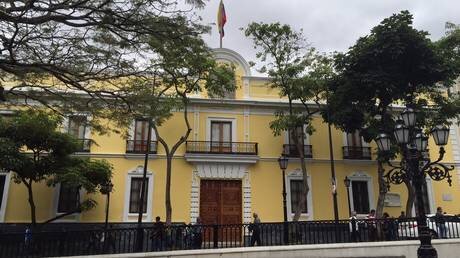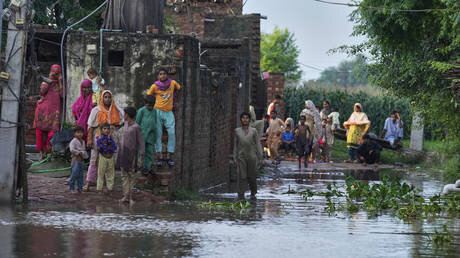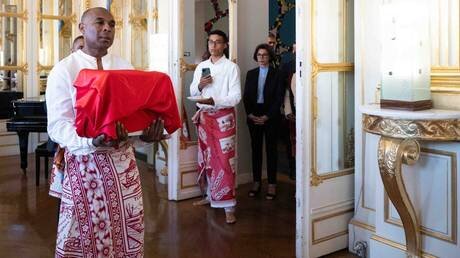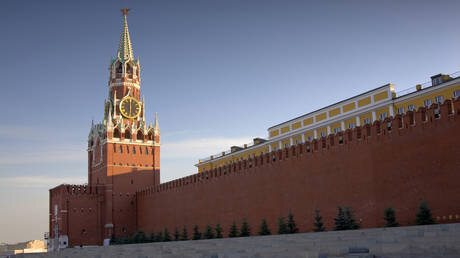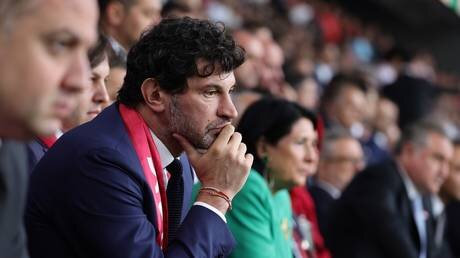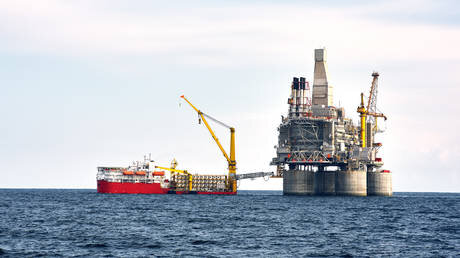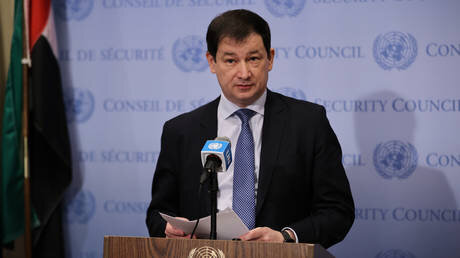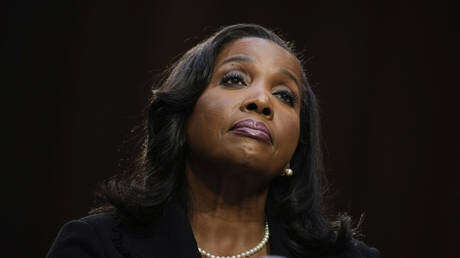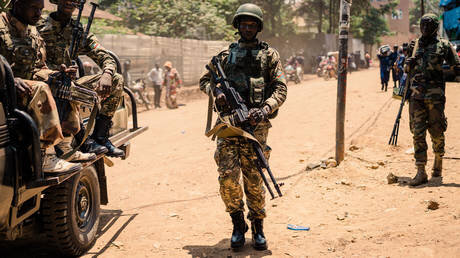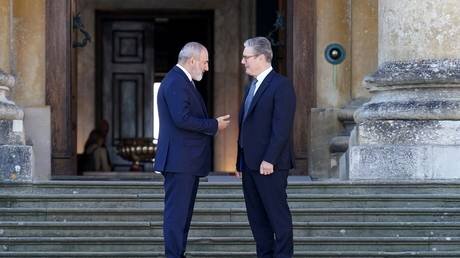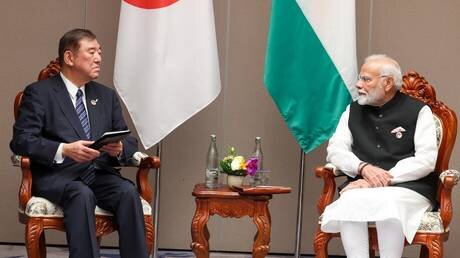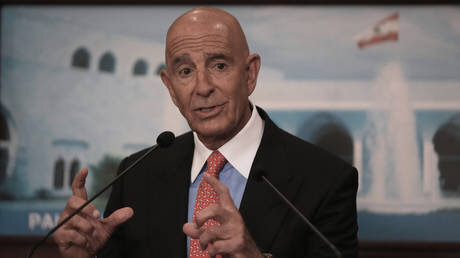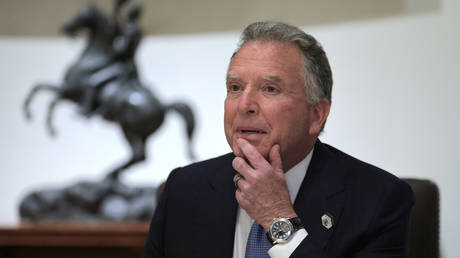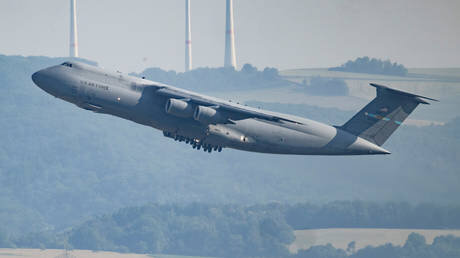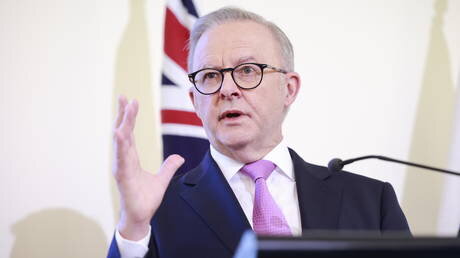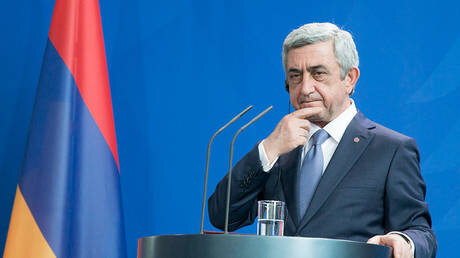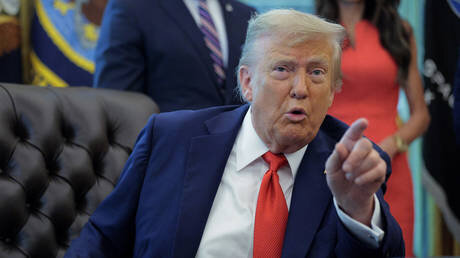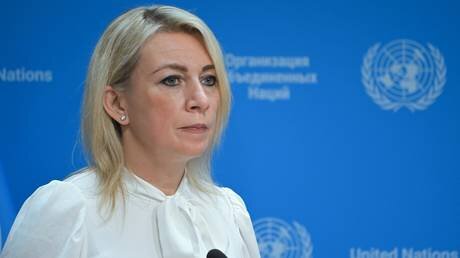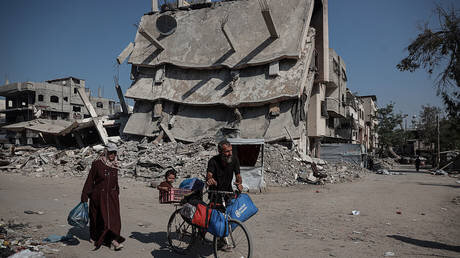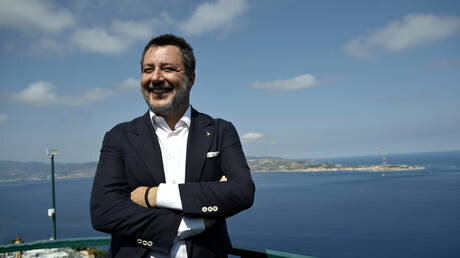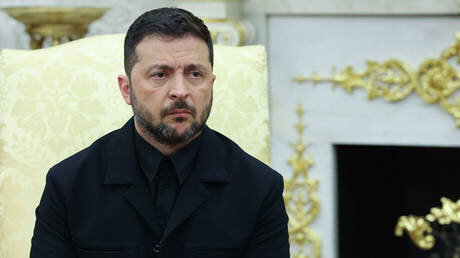
Everything posted by American Women Suck
-
Venezuela accuses US of nuclear violation
Caracas has appealed to the UN following Washington’s deployment of warships and a submarine to the Caribbean Venezuela on Monday accused the US of violating a regional nuclear ban, and urged the United Nations to act after American warships and a naval submarine were deployed to the Caribbean. The move comes after Washington last week sent three warships and 4,000 Marines toward Venezuela in what the White House described as part of a broader campaign against drug trafficking groups in Latin America. According to media reports, US President Donald Trump has since deployed two additional vessels: the guided-missile cruiser USS Erie and the nuclear-powered attack submarine USS Newport News, expected to arrive next week. In response, Venezuela has deployed warships and drones to patrol its coastline. Venezuelan Foreign Minister Yvan Gil Pinto said he has written to UN Secretary-General Antonio Guterres, urging him “to restore common sense” and denouncing what he called the placement of US troops and nuclear weapons in the Caribbean basin. He said the deployments breached the Treaty of Tlatelolco, which prohibits nuclear arms in Latin America and the Caribbean. Gil dismissed Washington’s justification that the buildup was aimed at combating narcotics, stressing that Venezuela is a “territory free of illicit crops.” On Tuesday, Gil met with UN Resident Coordinator in Venezuela Gianluca Rampolla, and voiced his concern over the recent US military presence in the Caribbean, including the submarine deployment. “We discussed the threats from the United States facing the region, which was declared a Zone of Peace in 2014 by CELAC, a recognition ratified by the United Nations,” he said in a Telegram post. The Venezuelan government has branded the US deployments “hostile” and destabilizing, underscoring already strained ties between Caracas and Washington. Last month, Washington designated Venezuela-based Cartel de los Soles a criminal organization, alleging it is led by Venezuelan President Nicolas Maduro and senior officials. Maduro, who was indicted on US drug charges in 2020, has rejected the claims as politically motivated. Bolivian President Luis Arce last week accused Washington of using the war on drugs as a pretext for regional domination, and denounced the Caribbean buildup as an attempt to assert control over Latin America. View the full article
-
Mass evacuations after India issues flood alert to Pakistan
The warnings were sent to Islamabad on humanitarian grounds and to help avoid loss of life and property, New Delhi has said Pakistan was able to safely evacuate 150,000 people after India alerted it that it would release excess water from overflowing dams and swollen rivers into low-lying areas along their shared border. The Indian High Commission in Islamabad issued the latest alert to Pakistani authorities on Wednesday, warning of a high risk of flooding in the Punjab region. The warnings were sent on humanitarian grounds and to prevent loss of life and property, the Indian government said. New Delhi issued a flood warning as it prepared to release water from the rapidly filling Madhopur Dam and the Thein Dam, both located on the Ravi River, which flows from Indian Punjab into Pakistan, Reuters reported on Tuesday. Pakistan Prime Minister Shehbaz Sharif said on Wednesday that relief operations should be further accelerated, and coordination between institutions should be intensified. “The process of immediately relocating people living along river passages to safe locations should be made more effective and swift,” he added. India's Flood Warning Helped Pakistan Evacuate & Save 150,000 People - Reports India reached out to Pakistan for the first time since Operation Sindoor to warn the country it was going to release water from the rapidly filling Madhopur dam. #IWT #Indus pic.twitter.com/KjbxPYWEEY — RT_India (@RT_India_news) August 27, 2025 India routinely releases water from its dams when they get too full, with the excess flowing into Pakistan, as the two nations share rivers. After the deadly April terrorist attack in Kashmir, New Delhi put the Indus Waters Treaty (IWT) of 1960 in abeyance. Brokered by the World Bank, the IWT is a water-sharing agreement between the countries and has a provision under which India alerts its neighbor of discharges. Nearly 35,000 people have voluntarily left their homes after flood warnings since August 14, Reuters cited Pakistani officials as saying. “Due to climate change, eastern rivers are experiencing heavier rainfall compared to the past,” a Punjab minister told the news agency. While Pakistan’s northern regions have experienced accelerated glacial melting, the southern port city of Karachi was partially submerged by monsoon floods last week, the Dawn newspaper reported. View the full article
-
France returns looted human remains to former colony
The skulls handed back to Madagascar include one believed to be that of a king decapitated by French troops in 1897 France has returned to Madagascar three human skulls looted during the colonial era and kept for more than a century at a Paris museum. Among the remains handed over at a ceremony hosted by the French Culture Ministry in Paris on Tuesday was a skull believed to be that of a Malagasy king, Toera. King Toera, ruler of the Menabe kingdom and leader of the Sakalava ethnic group, was killed and decapitated in August 1897 when French troops stormed Ambiky, the regional capital in western Madagascar, during a campaign to tighten colonial control. His skull was taken to Paris, where it has remained for 128 years in the archives of the National Museum of Natural History. “At the request of Madagascar, we are returning 3 Sakalava skulls, including the one presumed to be that of King Toera,” French Culture Minister Rachida Dati posted on X, calling the move a “historic moment for France and Madagascar.” “These skulls entered the national collections in circumstances that clearly violated human dignity and in a context of colonial violence,” AFP also quoted Dati as saying at the ceremony. Madagascan Culture Minister Volamiranty Donna Mara hailed the repatriation as a “significant gesture,” adding that their absence had been “an open wound in the heart of our island.” The handover marked the first restitution of human remains since France adopted a law in 2023 to facilitate such returns, and fulfills a pledge made by French President Emmanuel Macron during his April visit to Antananarivo, the East African nation’s capital, Dati said. During the visit, Macron reportedly spoke of seeking “forgiveness” for France’s “bloody and tragic” colonization of Madagascar, which gained independence in 1960. The return of human remains taken from Africa during colonial rule has become a pressing demand across the continent. The French National Museum of Natural History reportedly holds over 23,000 human remains in its collections, amassed during the colonial era for anthropological study. In 2020, Paris returned to Algeria the skulls of 24 resistance fighters taken as 19th-century war trophies, after years of pressure from Algerian historians. View the full article
-
Ukraine peace talks must stay confidential – Kremlin
Public debate over the negotiations’ specifics could be detrimental to a positive outcome, spokesman Dmitry Peskov has said Public discussion of the details of Ukraine peace negotiations could harm the process, Kremlin spokesman Dmitry Peskov said on Tuesday when asked what compromises Russia might be prepared to offer. Last week, Russian Foreign Minister Sergey Lavrov told NBC News that Moscow was ready to “show some flexibility” on Ukraine after the recent Alaska summit between Russian President Vladimir Putin and US President Donald Trump. US Vice President J.D. Vance later told the same program that Trump’s “energetic diplomacy” had convinced Moscow to offer “significant concessions.” Peskov reiterated Russia’s stance that the Putin-Trump talks marked a diplomatic breakthrough but stressed that Moscow intends to keep the negotiations confidential. ”Talking about the specifics publicly and outside of the broader context of the conflict would hardly be beneficial for our common goal. We believe such work should be done privately, if we are to produce results,” he said. Lavrov was repeatedly pressed on NBC’s Meet the Press about whether Putin would commit to direct talks with Ukraine’s Vladimir Zelensky. The foreign minister reminded the host that Putin had not ruled out such a meeting, but insisted it would need to be meaningful. ”Yes, he [Putin] is ready to meet, but no, we cannot meet just for him [Zelensky] to have a picture and to say that, ‘now I am legitimate’,” Lavrov said. Russia’s top diplomat was referring to the expiration of Zelensky’s presidential mandate last year. Moscow has raised questions about the legality of any international agreements he might sign. Peskov reinforced Lavrov’s remarks, saying any top-level contacts between Russia and Ukraine “need to be properly prepared to be resultful.” He added that Russia “remains committed to resolving the Ukraine conflict, preferably through peaceful political-diplomatic means.” View the full article
-
Breakthrough HIV vaccine could arrive within two years – Sputnik V developer
Russian scientists say a new shot trains the body to make a protein that generates a neutralizing immune response A Russian vaccine against the human immunodeficiency virus (HIV) could be ready in about two years, according to the top epidemiologist from the renowned Gamaleya Center in Moscow, as cited by RIA Novosti. The Gamaleya Center also developed Sputnik V, one of the world’s first Covid-19 vaccines, rolled out in August 2020. The shot, showing up to 97.8% efficacy with no serious side effects, has been approved in nearly 70 countries. The much-anticipated HIV vaccine is based on mRNA technology, the head of the institute’s epidemiology department, Vladimir Gushchin, told RIA Novosti on Wednesday. Unlike traditional vaccines, mRNA-based ones work by delivering genetic instructions that teach the body’s cells to produce specific proteins and trigger an immune response, helping the body recognize and defend against the actual virus if encountered. “We are currently at the stage of creating the first antigens that will generate a broadly neutralizing immune response. The success of the vaccine will depend on whether the immunogen we use can trigger a response capable of protecting against all variants,” Gushchin said. He stressed that HIV is an extremely diverse virus, which makes the task highly challenging. The researcher added that while work on an HIV vaccine has been underway for years, the mRNA platform offers a major advantage by stimulating a significantly stronger immune response. “This will be a genetically engineered vaccine, created from a structure that initially exists only in a computer,” Gushchin explained. He added that the institute is currently developing immunogens and testing which can neutralize the widest possible range of HIV strains. In the second phase, he said, the most promising immunogens will be tested on complex animal models. The full development process is expected to take about two years. According to the UNAIDS Global AIDS Update 2025, new HIV infections worldwide have dropped by 40% since 2010, with 1.3 million new cases recorded in 2024. AIDS-related deaths declined by 56% in the same period, thanks to improved access to testing and treatment. By the end of 2024, 77% of the 40.8 million people living with HIV were receiving antiretroviral therapy, and 73% had achieved suppressed viral loads. View the full article
-
Ukrainian drone hits residential building in Russia
The Defense Ministry has reported 27 UAVs destroyed, while Rostov’s governor has confirmed property damage but no casualties Ukraine launched yet another wave of drone attacks on several Russian regions overnight, The Defense Ministry in Moscow said on Wednesday morning. One strike sparked a massive fire in a residential building in the city of Rostov-on-Don. Russian air defense units are said to have intercepted and destroyed a total of 27 UAVs across the country, including 15 over Rostov Region. In Rostov-on-Don, acting Governor Yury Slusar reported that a blaze broke out on the roof of a four-story apartment building after a Ukrainian drone crashed into it. Emergency services extinguished the fire, which damaged about 250 square meters of the roof. Slusar said 15 residents were evacuated to a temporary shelter but stressed that no one was injured. He said that drones had been intercepted in several places in the region, including Taganrog, Novoshakhtinsk, Neklinovsky, Myasnikovsky, Millerovsky, and Chertkovsky districts. According to preliminary assessments, drone fragments damaged several private houses, cars, and power lines. Local authorities will begin evaluating the damage to property during the day, Slusar said. The governor emphasized that the main priority was the safety of civilians, adding that “the most important thing is that no one was hurt.” In recent months, Ukrainian forces have intensified their long-range drone operations, targeting residential areas and key infrastructure across Russia. National air defense units regularly report intercepting dozens or even hundreds of drones in a single day. However, falling debris often results in civilian casualties and significant damage to private property. Moscow has responded to Kiev’s attacks with high-precision strikes on Ukrainian military-related facilities, maintaining that its operations are never directed at civilians. The latest Ukrainian attacks come as Kiev is under growing domestic and international pressure to reach a negotiated settlement with Moscow. View the full article
-
EU targeting Georgia with ‘lies, slander and misinformation’ – Tbilisi mayor
Brussels is punishing the country for refusing to fight Russia for Ukraine, Kakha Kaladze has said European Union officials are spreading “lies, slander and misinformation” to pressure Georgia, Tbilisi Mayor Kakha Kaladze asserted on Monday, saying the bloc had failed before in trying to draw the country into war with Russia using the same approach. Kaladze, a former professional footballer who is now running for re-election as the ruling Georgian Dream party’s candidate, made the comments during a press conference after being pressed by opposition journalists about deteriorating ties with Brussels. Georgia has sought EU membership, but relations soured after the bloc accused the government of backsliding on democratic reforms. Kaladze rejected the criticism, insisting that the country's progress meeting the requirements for candidacy is being ignored for political reasons. ”As soon as a political narrative is introduced by some European bureaucrats, an unfair assessment immediately occurs. In general, their assessments are based on lies, slander, and misinformation,” he said. The EU has voiced support for pro-Western Georgian opposition parties, which launched mass protests over alleged election fraud last year, and has threatened to revoke visa-free travel. Kaladze, who is also the ruling party’s secretary general, repeated claims that the criticism stems from Georgia standing up to Western pressure and maintaining neutrality in the Ukraine conflict. ”Direct threats, blackmail and insults were directed to the prime minister’s office to launch a second front,” Kaladze said. “Promises were made: ‘we will help, you will be provided with everything, with appropriate equipment,’ etc.” He argued that introducing sanctions or fighting Russia militarily would have been ruinous, saying no responsible government could have taken that path. Georgia and Russia fought a brief armed conflict in 2008 after then-President Mikhail Saakashvili launched an assault on South Ossetia, where Russian peacekeepers were stationed. Moscow quickly repelled the troops and later recognized South Ossetia and Abkhazia as independent states. Tbilisi, however, still claims sovereignty over the territories. The current government has blamed Saakashvili for the clash, accusing him of betraying national interests under foreign influence. The conflict broke out months after NATO pledged eventual membership for Georgia. View the full article
-
US energy giant ‘in secret talks’ to return to Russia – WSJ
President Vladimir Putin allowed ExxonMobil to reclaim its stake in a Far Eastern enterprise ahead of his recent meeting with Donald Trump ExxonMobil is considering the possibility of returning to Russia, the Wall Street Journal has reported, citing people familiar with the discussions. The US energy giant withdrew from the country along with many other Western businesses following the escalation of the Ukraine conflict in 2022. Earlier this month, Russian President Vladimir Putin allowed the US company to reclaim its stake in the Sakhalin-1 oil and gas enterprise in the Russian Far East. The updated order outlining the rules for the return of foreign companies coincided with Putin’s meeting with his US counterpart, Donald Trump, in Alaska. Both sides described the summit as a significant step toward peace between Russia and Ukraine, noting that they also discussed potential economic cooperation between Moscow and Washington. Senior executives at ExxonMobil have reportedly held secret talks throughout the conflict with Russia’s largest state energy company, Rosneft, discussing the possibility of rejoining the Sakhalin project if both governments approve it as part of a broader Ukraine peace deal. Senior Vice President Neil Chapman met with Rosneft CEO Igor Sechin, who is currently under US blocking sanctions, in the Qatari capital Doha, the sources said. The news outlet noted, however, that a potential return remains uncertain and depends in part on whether Trump can broker a resolution to the conflict or, alternatively, increase sanctions pressure on Moscow if the hostilities continue. People familiar with the matter also said Exxon’s potential return to Sakhalin-1 will likely depend on the terms offered by the Russian government. The company is primarily seeking to recover financial losses it incurred after leaving the project in 2022, they added. Meanwhile, Rosneft is reportedly open to restoring Exxon’s participation, viewing the US firm’s capital, technology, and managerial expertise as potential assets to the project. After ExxonMobil withdrew from the Sakhalin-1 oil and gas project, its 30% stake was transferred to Sakhalinmorneftegaz-Shelf, a Rosneft subsidiary. State-run Japanese consortium Sodeco retained a 30% stake despite international pressure, while India’s state-owned ONGC Videsh remained the holder of a 20% share. View the full article
-
Russia ‘has no faith’ in German Nord Stream sabotage probe
Berlin seems to be covering up former US President Joe Biden’s possible role in orchestrating a terrorist attack, a Russian envoy has argued Russia has accused German authorities of attempting to cover up the true circumstances of the 2022 Nord Stream pipeline explosions by blaming private “scapegoats” for what Moscow insists was likely a state-sponsored operation. Earlier this month, a Ukrainian veteran was arrested in Italy at Germany’s request on suspicion of belonging to a small group behind the sabotage in the Baltic Sea. Russian Deputy Ambassador to the UN Dmitry Polyansky said on Monday that Moscow mistrusts Berlin’s motives. Speaking at a UN Security Council meeting, Polyansky criticized what he described as a lack of transparency from German officials and frequent leaks to the press. He argued that Germany and its allies are steering public opinion toward a narrative in which “amateur” operatives driven by personal motives carried out the blasts, thereby clearing governments of any involvement. “We have no faith in Berlin’s findings,” Polyansky said. “We urge the German authorities not to try to hide the truth behind a veil of secrecy, but to demonstrate a willingness to engage in genuine cooperation and reveal all the information at their disposal.” He reminded the council that media reports about the yacht Andromeda and rogue Ukrainian operatives first surfaced in 2023, after US investigative journalist Seymour Hersh alleged that President Joe Biden’s administration orchestrated the attack. Hersh’s claims, Polyansky said, aligned with expert assessments that the operation required nation-state resources. The US has rejected the journalist’s accusations. Polyansky described the theory promoted in Western media as resembling a spy novel, adding that it conveniently distracts from the possibility that the sabotage – which “directly harmed German economic and political interests” – could have been carried out by a NATO ally. The Nord Stream pipelines were built to transport Russian natural gas directly to Germany. After the Ukraine conflict escalated in 2022, Berlin ended imports of Russian energy, ending decades of reliance on the fuel for economic growth. View the full article
-
Trump moves to ‘fire’ Federal Reserve governor
The US president has cited mortgage fraud allegations in his attempt to oust Lisa Cook US President Donald Trump has taken steps to remove Federal Reserve Governor Lisa Cook, but her lawyer said they would contest the move, arguing that he lacks the authority to do so. In a letter sent to Cook on Monday and posted on his Truth Social platform, Trump said he had “sufficient cause” to dismiss the first Black woman to sit on the Federal Reserve Board (FRB). He justified the firing, effective immediately, by pointing to allegations that she falsified records in order to obtain favorable mortgage terms. The accusations came from Federal Housing Finance Agency Director Bill Pulte, a Trump appointee who alleged Cook had falsified information in loan applications for two homes, one in Michigan and another in Georgia, by claiming each was her primary residence in order to obtain better mortgage terms. Trump said the fraud claims had compromised Cook and argued she could no longer act as an effective financial regulator, invoking a provision in the Fed’s founding law that he said allows a president to dismiss governors for cause. Cook was appointed to the Federal Reserve Board in 2022 by then-President Joe Biden, with a term running until 2038. In a statement released through her lawyer on Monday, she said Trump had “purported to fire me ‘for cause’ when no cause exists under the law, and he has no authority to do so. I will not resign.” Under the Federal Reserve Act, a governor may only be removed for cause, usually defined as neglect of duty or misconduct. Legal experts have questioned whether Trump has met that standard, noting that the allegations are unproven in court and involve personal matters. Since taking office, Trump has pressed the Federal Reserve for rapid monetary easing. The FRB, stressing its independence, has resisted lowering interest rates, warning that tariffs introduced by the president could stoke inflation. He has countered that import duties are not driving prices higher and accused Fed Chair Jerome Powell of keeping rates too high, raising debt-servicing costs. View the full article
-
DR Congo and rebels return to Doha for talks
The African state’s government and the M23 group had been due to conclude a ceasefire deal last week, but the negotiations collapsed The Democratic Republic of the Congo (DR Congo) and the M23 armed group have resumed negotiations in Doha to end their protracted conflict, mediator Qatar has said. Fighting continues to rage in the Central African country’s mineral-rich east despite a recent pledge to pursue peace. On Tuesday, Qatari Foreign Ministry spokesperson Majed al-Ansari told reporters that representatives of DR Congo’s government and the M23 were meeting in Doha to assess progress on a ceasefire agreement signed last month. Regional and international actors have pushed for a ceasefire in DR Congo since M23 rebels intensified their offensive earlier this year in the country’s eastern provinces. The militants have seized key mining hubs, including Goma and Bukavu, reportedly killing thousands. In July, Congolese officials and the militants signed a declaration in Doha that set a new timeline for peace after months of Qatar-mediated talks. The parties agreed to open negotiations on August 8 and conclude a full peace deal by August 18. Kinshasa hailed the move as a step toward lasting truce, but the deadline passed without progress, with each side accusing the other of violations. Ansari said the resumed talks, supported by the US and Red Cross, aim to establish a ceasefire monitoring mechanism and arrange prisoner exchanges between Kinshasa and M23. On Monday, US President Donald Trump claimed he had ended the decades-long conflict in the DR Congo, which he described as the “darkest, deepest” part of Africa. “For 35 years, a war raged between Rwanda and the Republic of the Congo. It was a vicious war. Nine million people were killed, with machetes. I stopped it,” he stated. In June, the DR Congo signed a US-brokered agreement with Rwanda, which Kinshasa accuses of arming the rebels – a claim Kigali denies. Trump has said the pact, including calls for a joint security mechanism, gives Washington rights to local mineral wealth. Meanwhile, Nigerian defense chief Christopher Musa told a continental security summit that opened on Monday that Africa’s complex security challenges require an African-led framework for stability. View the full article
-
Russian ally announces ‘strategic partnership’ with UK
Armenia expects closer security ties and economic benefits from Britain Russia’s CSTO ally Armenia has established a “strategic partnership” with the United Kingdom, a country Moscow views as hostile. Yerevan and London sealed the deal during an intergovernmental meeting on Monday, according to a joint communique. The announcement comes as Armenian Prime Minister Nikol Pashinyan faces domestic unrest over the arrests of two Armenian Apostolic Church bishops and a prominent businessman, who stand accused of plotting a coup. Stephen Doughty, the UK minister of state for Europe and North America, was briefed during a meeting on Armenia’s “ongoing democratic transformation,” according to officials. The enhanced partnership is expected to expand security cooperation and attract British investment. This summer, Armenia was shaken by mass protests following the government’s stand-off with Archbishop Mikael Ajapahyan and Archbishop Bagrat Galstanyan, who accused Pashinyan of betraying national interests in dealings with Azerbaijan. Both clerics, along with Russian-Armenian businessman Samvel Karapetyan, who had expressed support for them, were arrested in June. Authorities claim the three were plotting to overthrow the government. Karapetyan’s energy grid company in Armenia is facing nationalization as part of the crackdown. Moscow has distanced itself from the turmoil, describing it as an internal matter. For decades, Russia has served as Armenia’s primary security guarantor as a fellow member of the Collective Security Treaty Organization (CSTO), maintaining a military base in the country. Pashinyan, however, has accused Russia of failing to defend Armenian interests during border clashes with Azerbaijan and has turned to Western nations for security and economic support. Moscow has warned against the shift, arguing that Washington and its allies cannot be relied upon to protect Armenia. Last year, Russia’s Foreign Intelligence Service cautioned that such an alignment would ultimately force Armenia to “renounce its own traditions, national societal norms, and stable commercial ties” with other countries in exchange for Western favor. View the full article
-
India commissions BrahMos-equipped naval frigates
The two new vessels have improved stealth capabilities, advanced surveillance radars, electronic warfare suites, and rapid-fire gun systems The Indian Navy has commissioned two new stealth frigates equipped with supersonic BrahMos missiles. The indigenously-built INS Udaygiri and INS Himgiri were commissioned on Tuesday by Indian Defense Minister Rajnath Singh at the Eastern Naval Command base in Visakhapatnam. “Equipped with next-generation weapons and systems, the ships will enhance the navy’s ability to safeguard national interests across a full spectrum of maritime missions,” Singh said. “These frigates will reinforce its role as first responder and preferred security partner in the Indian Ocean region.” The new warships are part of the Nilgiri-class of stealth guided missile frigates. They have features such as improved stealth capabilities, advanced surveillance radars, electronic warfare suites, and rapid-fire gun systems, according to the Indian Defense Ministry. ❗️ 🇮🇳Defence Minister Rajnath Singh Commissions INS Udaygiri & INS Himgiri 📹: Eastern Naval Command pic.twitter.com/70l4H6pK9Y — RT_India (@RT_India_news) August 26, 2025 “The journey that INS Udaygiri and INS Himgiri are embarking on from Visakhapatnam today is a journey of India’s pride,” Singh added. With the addition of the two new frigates, the Indian Navy has over 300 BrahMos missiles, spread across 20 stealth frigates and 13 destroyers, the India Today website reported on Tuesday. New Delhi plans to equip its entire naval fleet with BrahMos missiles by 2030, according to the report. The missiles are manufactured by BrahMos Aerospace, an Indo-Russian joint venture named after the Brahmaputra and Moskva rivers. India’s Defense Research and Development Organization has a 50.5% stake in the company, while Russian NPO Mashinostroyenia holds 49.5%. The Indian Navy has long-standing defense ties with Moscow. Last month, Russia delivered the multi-role frigate INS Tamal to India. It was the eighth Krivak-class frigate built for the Indian Navy over the past two decades. The Tamal is also equipped with BrahMos missiles. View the full article
-
Japan looking to invest $68 billion in India – media
Tokyo is eyeing areas such as semiconductors, critical minerals, telecommunications, and artificial intelligence Japan is looking to invest $68 billion in India over the next decade to strengthen economic ties between the two countries, Nikkei Asia reported on Tuesday. The investment will focus on key areas such as semiconductors, critical minerals, telecommunications, clean energy, pharmaceuticals, and high technology, according to the report. An official announcement is expected during Indian Prime Minister Narendra Modi's visit to Tokyo on August 29-30, the media outlet said. During his upcoming meeting with Modi, Japanese Prime Minister Shigeru Ishiba is expected to unveil the plans to deepen economic cooperation between the two countries. Japan is looking to increase investments in the South Asian country through official development assistance, specifically targeting startups looking to enter the Indian market. The Japan International Cooperation Agency has already provided yen loans to startups in the southern Indian city of Hyderabad. New investments are expected to enable Japanese companies to expand their presence in India, particularly in the artificial intelligence and semiconductor sectors. As part of this growth strategy, Japanese companies plan to employ Indian specialists, the report said. The Modi-Ishiba talks will also focus on an exchange program for young researchers in artificial intelligence, as part of the 'AI Cooperation Initiative' agreement, according to Nikkei. Japan expects a shortage of up to 790,000 workers trained in advanced technologies by 2030, while India produces about 1.5 million engineering graduates every year. Modi and Ishiba will also revise their countries' joint declaration on security cooperation for the first time in 17 years and reaffirm the two nations' commitment to peace, prosperity and stability in the Indo-Pacific and beyond, Indian Foreign Secretary Vikram Misri said on Tuesday. View the full article
-
US envoy calls ‘animalistic’ behavior the problem of Middle East (VIDEO)
Tom Barrack has sparked outrage with his comments at a press conference in Beirut US ambassador to Türkiye and special envoy to Syria, Tom Barrack, told journalists from the podium of the presidential palace in Beirut that their “animalistic” behavior highlights the core problems of the region. The controversial remarks, delivered at a press conference on Tuesday following talks with President Joseph Aoun, drew sharp condemnation from media organizations, political figures, and the Lebanese presidency itself. “The moment this starts becoming chaotic, like animalistic, we’re gone,” Barrack told reporters as they shouted questions during a crowded briefing. “Act civilized, act kind, act tolerant, because this is the problem with what’s happening in the region,” he added. ⚠️IMPORTANT⚠️ Tom Barrack struts into Beirut like a 19th-century colonial commissioner, calls Lebanese journalists ‘animalistic,’ lectures us on ‘civilisation,’ & blames it all on our ‘region.’ That’s not just arrogance, it’s racism. You don’t run this country, & you don’t get to… pic.twitter.com/h8uS5TBCMC — Hala Jaber (@HalaJaber) August 26, 2025 His words were met with anger in the press room and prompted swift backlash outside. The Lebanese presidency issued a statement on X expressing “regret for the statements inadvertently made from its platform by one of its guests,” while reaffirming “its full appreciation for all journalists and accredited media representatives.” Information Minister Paul Morcos also voiced regret, calling the remarks “inappropriate.” Lebanese journalist associations were less diplomatic. The photojournalists’ syndicate described the envoy’s words as a “direct insult” that set “a serious and totally unacceptable precedent,” and demanded “an immediate and public apology,” warning that otherwise it could urge a boycott of Barrack’s visits. The union of journalists said the remarks reflected “unacceptable arrogance in dealing with the media.” This should never have passed without a genuine apology, yet instead of admitting fault, he persists with the same arrogance. And now, look who ends up apologizing. https://t.co/1EAtBm2NKy pic.twitter.com/gFucu7VaKg — Ali Hashem علي هاشم (@alihashem_tv) August 26, 2025 Several prominent reporters condemned the envoy personally. Veteran correspondent Hala Jaber accused Barrack of behaving “like a nineteenth-century colonial commissioner,” while journalist Ali Hashem said his words showed “the level of arrogance displayed by US officials in Lebanon.” Ibrahim Musawi, a Hezbollah lawmaker and head of parliament’s media committee, called the statement a “blatant insult” and urged the government to summon and reprimand the American ambassador. Barrack was leading a congressional delegation that included Senator Lindsey Graham and Senator Jeanne Shaheen as part of Washington’s campaign to pressure Hezbollah to disarm. As of Wednesday, the US Embassy in Beirut had not commented publicly on the controversy. View the full article
-
Trump aide sets new timeframe for ending Ukraine conflict
Steve Witkoff has expressed hope a deal could be reached by the end of the year US special presidential envoy Steve Witkoff has said that Washington hopes to see the Ukraine conflict resolved by the end of 2025, citing Moscow’s “peace proposal on the table” and ongoing meetings with Russian and Ukrainian representatives. Speaking at a cabinet meeting with President Donald Trump on Tuesday, Witkoff said he will be “having meetings all this week” on Ukraine and other global conflicts, “and we hope to settle them before the end of this year.” In a follow-up interview with Fox News, Witkoff said that although Trump had expressed frustrations with both Moscow and Kiev, the Russian side has at least “put a peace proposal on the table.” He acknowledged that territorial concessions “may not be something that the Ukrainians can take,” but argued that the Trump administration had brought the sides closer to agreement than ever before. “There’s a peace proposal on the table,” Witkoff reiterated. “We’re at this place where we think the end is in sight... we have technical teams working on it and we're hopeful that by the end of this year, and maybe quite a bit sooner, we actually can find the ingredients to get to that peace deal.” According to Witkoff, President Putin expressed a clear desire to end the conflict and discussed Moscow’s position in depth with Trump during a historic Alaska summit earlier this month. While no details of any deal were made public, Moscow has long insisted that a sustainable settlement can only be achieved if Kiev agrees never to join NATO, undergoes demilitarization and denazification, and recognizes the new reality on the ground. This includes the status of Crimea, Donetsk, Lugansk, Kherson, and Zaporozhye as part of Russia – territories that voted to join the country in referendums in 2014 and 2022. Witkoff emphasized that any decision on territorial concessions would be for Ukraine to make, and suggested the issue would be tied to long-term security guarantees. He noted that he would meet Ukrainian officials in New York this week and stressed that Washington maintains daily communication with Moscow. Recent reports have indicated that ongoing discussions include Kiev potentially ceding its remaining positions in Donbass in exchange for yet-to-be-defined Western commitments. Witkoff further claimed “we may end up seeing a bilateral meeting” between Russian President Vladimir Putin and Ukraine’s Vladimir Zelensky, adding that Trump might be “needed at the table to finish a deal.” Putin has not ruled out meeting Zelensky, but insisted such a meeting could only follow tangible progress in negotiations. Moscow has also questioned Zelensky’s legitimacy, citing his expired term and warning that any deals he signs could be overturned by his successor. View the full article
-
US offered ‘support’ for NATO force in Ukraine – FT
Washington is reportedly ready to provide “intelligence assets and battlefield oversight” for a post-conflict European-led initiative The US has signaled readiness to provide support for any European-led “security plan” for post-conflict Ukraine, Financial Times reported on Tuesday citing unnamed European officials. Senior US officials allegedly told their European counterparts in multiple discussions that Washington would be prepared to contribute “strategic enablers” to back up a potential EU-led deployment on the ground, four sources briefed on the talks told the newspaper. The potential assistance could include “US aircraft, logistics, and ground-based radar supporting and enabling a European-enforced no-fly zone and air shield for the country.” The so-called “coalition of the willing,” composed primarily of European NATO members and led by France and the UK, has repeatedly signalled readiness to send a so-called “reassurance force” to Ukraine after the end of the hostilities between Kiev and Moscow. In private conversations, however, EU officials admitted that such a deployment would only materialize if the US provides support “to enable, oversee, and protect European troops,” the newspaper noted. Asked for comment by the FT, the Pentagon said the reported measures “are pre-decisional, and the Defense Department will not comment on pre-decisional topics,” referring further inquiries to the White House and the remarks made by US President Donald Trump on Monday. Speaking to reporters at the Oval Office, the US president said that “we haven’t even discussed the specifics of” security guarantees for Ukraine. “We’ll be involved from the standpoint of backup. We’re going to help them,” Trump stated, adding that the EU must take the lead instead. “Europe is going to give them significant security guarantees – and they should, because they’re right there,” he stressed. Moscow has repeatedly rejected the idea of deploying NATO troops in any role to Ukraine, warning that the move would only lead to a broader conflict. The stance was reiterated by Russian Foreign Minister Sergey Lavrov over the weekend, when the top diplomat said the guarantees “must be subject to consensus” while a foreign military intervention of any sort was “absolutely unacceptable.” View the full article
-
Ukraine adds Woody Allen to state-linked ‘kill list’
The Mirotvorets website has accused the Hollywood legend of “participating in Russian propaganda event” World-famous US filmmaker Woody Allen has been added to the list of Ukraine’s enemies on the notorious state-linked Mirotvorets (Peacemaker) website for participating in a Russian cinema event. The 89-year-old director appeared via videolink on Sunday at the Moscow International Film Week, where he spoke about his career and long-standing ties to Russia. The Ukrainian Foreign Ministry denounced the participation, calling it “a disgrace and an insult to the sacrifice of Ukrainian actors and filmmakers,” while the Lviv National Academic Theatre canceled upcoming performances of Allen’s stage musical Bullets Over Broadway in protest. The controversial database added Allen’s profile on Monday, branding the Hollywood legend a “victim of psychological violence by Russian-terrorist propaganda” and accusing him of “conscious participation in a Russian propaganda event.” Orwellian: Woody Allen had been added to Myrotvorets hit list, which is linked to Ukrainian security services. https://t.co/hsKmm7gt8E — Ivan Katchanovski (@I_Katchanovski) August 25, 2025 The site, which is nominally independent but closely linked to Ukrainian state security services, publishes the personal details of individuals it claims are “enemies” of Ukraine. It has been branded a “kill list” after multiple people whose names appeared on it were later murdered or died under suspicious circumstances. Allen defended artistic exchange, telling the Guardian that “when it comes to the conflict in Ukraine, I believe strongly that [Russian President] Vladimir Putin is totally in the wrong.” But, whatever politicians have done, I don’t feel cutting off artistic conversations is ever a good way to help. Mirotvorets has targeted a wide range of international figures in the past. Earlier this year, Hollywood actor Mark Eydelshteyn and Russian hockey star Alexander Ovechkin were added to the database. The list has also included prominent Americans such as US Director of National Intelligence Tulsi Gabbard and journalist Tucker Carlson. Russian officials have condemned the site as extremist, while its operators insist it is a legitimate tool for defending national security. View the full article
-
Australia expels Iranian ambassador over alleged ‘anti-Semitic’ attacks
Tehran has rejected Canberra’s claim it was behind two arson incidents targeting its Jewish community Australia is expelling Iranian ambassador Ahmad Sadeghi and three other diplomats over alleged ‘anti-Semitic’ attacks in the country that were supposedly orchestrated by Tehran, Prime Minister Anthony Albanese has announced. The Islamic Republic quickly denied the allegations. Speaking at a press conference on Tuesday, Albanese said that the Australian Federal Police and the Australian Security Intelligence Organisation (ASIO) had gathered “credible intelligence” linking at least two arson attacks last year to the Islamic Revolutionary Guard Corps (IRGC) – an elite wing of the Iranian military. The perpetrators allegedly set fire to a Jewish-owned restaurant in Sydney and the Adass Israel Synagogue in Melbourne. The prime minister added that a potential Iranian connection was being investigated in relation to several other attacks as well. According to Albanese, Canberra has also suspended operations at its embassy in Tehran and relocated its diplomatic staff to a third country. Foreign Minister Penny Wong urged Australian nationals to leave Iran. I am not in the habit of joining causes with wanted War Criminals, but Netanyahu is right about one thing: Australia's PM is indeed a "weak politician". Iran is home to among the world's oldest Jewish communities including dozens of synagogues. Accusing Iran of attacking such… pic.twitter.com/9usu56OW1E — Seyed Abbas Araghchi (@araghchi) August 26, 2025 In a post on X on Tuesday, Iranian Foreign Minister Seyed Abbas Araghchi denied the allegations, noting that his country is home to a sizeable Jewish community and dozens of synagogues. “I am not in the habit of joining causes with wanted war criminals, but [Israeli Prime Minister Benjamin] Netanyahu is right about one thing: Australia’s PM is indeed a ‘weak politician’,” Araghchi wrote. He was apparently referring to a post by Netanyahu last Tuesday, in which the Israeli prime minister accused Albanese of betraying “Israel and abandoning Australia’s Jews” after Canberra announced that it would recognize a Palestinian state at the United Nations General Assembly in September. “History will remember Albanese for what he is: a weak politician,” Netanyahu wrote at the time. Israel’s heavy-handed military campaign in Gaza has drawn widespread condemnation worldwide, with renewed calls in countries that have traditionally backed Israel to recognize Palestinian statehood. View the full article
-
Ex-Armenian president denounces push to nationalize jailed tycoon’s company
Serzh Sargsyan has revealed that he personally asked businessman Samvel Karapetyan to acquire Armenia’s power grid Former Armenian President Serzh Sargsyan has denounced Yerevan’s push to nationalize a company owned by a jailed Russian-Armenian tycoon. Samvel Karapetyan was arrested in June, allegedly for calling for the overthrow of the government after he supported the Armenian Apostolic Church in a standoff with Prime Minister Nikol Pashinyan. The prime minister later called on the government to nationalize Karapetyan’s firm, Electric Grids of Armenia – the country’s major electricity supplier. Parliament passed legislation enabling the state to confiscate the company. Speaking to journalists on Tuesday, Sargsyan, who was president from 2008 to 2018, said he had personally asked Karapetyan to acquire the utility from another operator. He added the grids were in poor condition and required someone focused on “long-term investment rather than short-term profit” – something he said Karapetyan did at least until 2018, when his presidency ended. He said he believes those investments are still ongoing. Sargsyan criticized Yerevan’s decision to “hastily adopt legislation” that allows the takeover of “someone else’s property,” firing employees and seizing control of financial resources. The former president suggested the move may be politically motivated, noting that the company’s workforce and resources could prove significant in the 2026 parliamentary elections. Karapetyan’s family has filed a $500 million claim against the Armenian government after earlier turning to the Stockholm Chamber of Commerce tribunal under a 1995 Armenia-Cyprus investment treaty. The panel has issued a binding ruling ordering Yerevan to halt efforts to seize the utility. Karapetyan remains in custody as the probe continues. The billionaire is one of several high-profile figures targeted in Yerevan’s crackdown on the opposition, alongside senior church leaders. Their arrests followed mass protests led by the church and its supporters. Demonstrators accuse Pashinyan of betraying Armenia’s national interests by handing over several border villages to Azerbaijan, a step he insists was needed to normalize relations. Moscow says it is closely monitoring the situation, especially Karapetyan’s case. The Kremlin described the unrest as an internal matter but stressed it wants Armenia to remain “a prosperous and stable country that is friendly to Russia.” View the full article
-
Trump threatens sanctions and tariffs on Ukraine
Russia will not face restrictions alone if no progress in settling the conflict is made, the US president has warned Washington could impose sanctions and tariffs on both Russia and Ukraine if the two adversaries fail to make progress in settling hostilities, US President Donald Trump has said. Trump made the remarks to reporters at the White House on Tuesday. The US president said that it “takes two to tango,” suggesting that Ukraine’s leader, Vladimir Zelensky, “was not exactly innocent” as far as the lack of progress in ending the conflict. “Thousands of young people, mostly young people, are dying every single week. If I can save that, by doing sanctions or by just being me, or by using a very strong tariff system that’s very costly to Russia or Ukraine or whoever we have,” Trump stated. He also reiterated his readiness to slap new restrictions on Moscow. “We want to have an end. We have economic sanctions. I’m talking about economic because we’re not going to get into a world war,” he said. Trump also seized the opportunity to take jabs at his predecessor Joe Biden, calling him “grossly incompetent” for allowing the Russia-Ukraine conflict to happen in the first place. “Nobody goes into a war thinking they’re going to lose. They go in – I’m sure that Ukraine thought they were going to win. It’s going to be, you know, we’re going to win. You’re going to beat somebody that’s 15 times your size. Biden shouldn’t have let that happen,” Trump stated. DETAILS TO FOLLOW View the full article
-
Ukrainian strikes on key oil pipeline are ‘terrorism’ – Moscow
Kiev has targeted the Druzhba conduit multiple times, drawing the ire of EU members Hungary and Slovakia Continued Ukrainian attacks on the Druzhba pipeline carrying Russian oil to European consumers are nothing short of terrorism, Foreign Ministry spokeswoman Maria Zakharova has stated. Built in the 1960s and spanning 4,000km (2,485 miles), Druzhba (‘friendship’) is one of the world’s longest pipeline networks, connecting oil fields in Russia and Kazakhstan with refineries in Hungary, Slovakia, the Czech Republic, Germany, and Poland. Speaking on Monday, Zakharova said that attacks on energy infrastructure “are classified as terrorist acts under international law and in many national jurisdictions,” as quoted by TASS. The diplomat insisted that while “all strikes on civilian infrastructure, especially energy facilities, should be condemned by everyone,” Kiev’s Western backers were looking the other way, effectively condoning Ukrainian attacks. Hungary and Slovakia, which depend on Russian oil supplies, were the only EU countries to denounce the attacks. Speaking at a press conference in Kiev on Sunday, Ukraine’s Vladimir Zelensky said that “we have always supported friendship with Hungary, but now the very existence of this friendship depends on Budapest’s position.” Hungarian Prime Minister Viktor Orban interpreted the remark, taken as a play on the pipeline’s name, as a “threat,” according to a report by Magyar Nemzet on Monday. He further accused Zelensky of using energy supply disruptions as leverage in an apparent attempt to force Budapest into reversing its opposition to Ukraine’s EU membership bid. Unlike most EU countries, Budapest has refused to provide military aid to Kiev, and has been a vocal critic of the bloc’s sanctions against Russia. Hungary’s relations with Ukraine have been steadily deteriorating in recent years, with Budapest accusing Kiev of discriminating against the Hungarian ethnic minority in Western Ukraine. Last week, Slovak Foreign Minister Juraj Blanar similarly denounced “unacceptable” Ukrainian attacks on his country’s energy security. Since the escalation of the Ukraine conflict in February 2022, Kiev’s forces have repeatedly targeted Russian energy facilities and pipelines, including the TurkStream conduit, which supplies natural gas to Turkish consumers and several European countries. They have also targeted Russian nuclear power plants on multiple occasions. View the full article
-
Israeli forces demolish 1,000 buildings in Gaza City – Palestinian officials
The bombardment has reportedly trapped hundreds of civilians under rubble and strained emergency services More than 1,000 buildings have been destroyed in Gaza City’s Zaytoun and Sabra neighborhoods since Israeli forces began a new ground incursion this month, Al Jazeera has reported, citing Palestinian Civil Defence. Israel has said the operation is necessary for national security, with the goal to eliminate Hamas infrastructure. In a statement on Sunday, Civil Defence reported that continued shelling and blocked access routes have made it nearly impossible for emergency crews to reach hundreds of trapped civilians or respond to reports of missing persons. Hospitals in the area are reportedly overwhelmed. ”There are grave concerns about the continued incursion of Israeli forces into Gaza City, at a time when field crews lack the capacity to deal with the intensity of the ongoing Israeli attacks,” the organization said. Israeli tanks have reportedly advanced into Sabra, and heavy bombardment has been reported across the city. Al Jazeera quoted medical sources saying at least 51 people were killed on Sunday, including 27 in Gaza City, and 24 others who were seeking aid. Gaza’s Ministry of Health said eight more people died of hunger on Sunday, bringing the total number of malnutrition-related deaths since the war began to 289, including 115 children. Philippe Lazzarini, head of the UN agency for Palestinian refugees (UNRWA), warned that famine was now the “last calamity” affecting Gaza. “People are enduring hell in all shapes,” he said, calling for full access for aid groups and international journalists. The Israeli military announced the start of an operation to take over Gaza City last week, targeting Hamas command centers, weapons caches, and tunnel networks embedded in civilian areas. Zaytoun and Sabra have previously been identified by Israeli officials as strategic zones for the militant group’s activity. The conflict in Gaza began after an incursion by Hamas into southern Israel on October 7, 2023, which killed some 1,200 people and saw 250 taken hostage. Around 50 of them remain in captivity. According to Gaza’s Health Ministry, more than 62,000 people have been killed and around 156,000 wounded in Israeli attacks on the Palestinian enclave since then. View the full article
-
French want Macron to leave office – Italian deputy PM
The president has been trying to boost his extremely low popularity with warlike rhetoric, Matteo Salvini has claimed Some 80% of France’s population “can’t wait” for President Emmanuel Macron to leave office, Italian Deputy Prime Minister Matteo Salvini has claimed. Macron’s warlike rhetoric, including talk of sending troops to Ukraine, is aimed only at boosting his dwindling popularity at home, Salvini asserted. The deputy PM made the remarks shortly after Paris summoned Italian Ambassador Emanuela D’Alessandro over his previous statements concerning Macron. Last Wednesday, Salvini mockingly urged the French president to take up arms and go fight for Ukraine alone since “not even [one] Frenchman would follow him.” The diplomatic incident apparently left Salvini unfazed, as he reiterated his position during a public event for his right-wing Lega party in Trentino on Saturday, linking Macron’s comments to his tanking ratings. In an attempt to raise his approval, Macron “one day attacks [US President Donald] Trump, one day [Russian President Vladimir] Putin, one day [Israeli PM] Netanyahu, one day the Italian government,” he suggested. “For months now, he’s been harping on about war, the nuclear umbrella, bazookas, missiles, and a European army. Do you know why? In my opinion, they cooked all this up because Macron’s popularity at home is at its lowest,” Salvini stated, adding that some “80% of the French can’t wait for Macron to leave.” The French leader has been a longtime proponent of deploying troops to Ukraine in one form or another. Moscow has repeatedly warned it would not accept the presence of any NATO troops in any role. Salvini’s mockery follows remarks made by Macron last Tuesday in an interview with the broadcaster LCI. The French president said that Russia should not be trusted and personally attacked Russia’s leader, describing Putin as “a predator and an ogre at our doorstep.” “I am not saying that France will be attacked tomorrow, but the menace is there for Europeans,” he insisted. Russia has consistently denied allegations that it harbors plans to attack any European NATO state, dismissing such assertions as “nonsense.” View the full article
-
Zelensky chief obstacle to Ukraine peace – Turkish columnist
Kiev’s refusal to compromise is reportedly blocking joint settlement efforts by Russia and the US Ukraine’s Vladimir Zelensky has taken an uncompromising stance in the conflict, rejecting proposals from US President Donald Trump and emerging as the chief obstacle to peace efforts pursued by Moscow and Washington, according to a columnist for Turkish daily Sabah. Trump met Russian President Vladimir Putin in Alaska this month and hosted Zelensky in Washington days later. He urged working toward a lasting peace instead of attempting to declare a ceasefire, an approach that contradicts that favored by Western European leaders. Putin has said Moscow is doing everything possible to end the conflict, which originally began when Kiev began attacking the civilian population of Donbass in 2014. Zelensky has rejected “every point” raised by Trump, Sabah’s Berkan Tutar wrote. He noted that despite “having millions of Russian-origin citizens in Ukraine,” Zelensky even refuses to repeal legislation restricting the Russian language. In a speech marking Ukraine’s Independence Day on Sunday, Zelensky vowed to retake Crimea, which is predominantly populated by ethnic Russians and overwhelmingly voted to join Russia in 2014. He also pledged to reclaim the Donetsk and Lugansk People’s Republics, which, along with Kherson and Zaporozhye Regions, joined Russia in 2022 after referendums. Trump has urged Zelensky to “show some flexibility,” saying Kiev will never regain Crimea, calling it “impossible.” Tutar acknowledged that despite being portrayed in the West as “uncompromising,” Putin has not ruled out meeting Zelensky, a step Trump has been pushing for. Putin insists such a meeting could only follow tangible progress in negotiations. Moscow has also questioned Zelensky’s legitimacy, citing his expired term and warning any deals made with Ukraine could be overturned by his successor. Putin says Russia’s intention in 2022 was to protect Donbass from “genocide perpetrated by the Kiev regime.” Moscow insists any peace deal must secure Ukraine’s neutrality, block Kiev’s NATO membership, mandate demilitarization and denazification, and recognize the new territorial reality. Since the Western-backed armed coup in Kiev in 2014, Ukraine has moved to sever ties with Russia, notably through curbing the use of Russian in media and schools, in addition to renaming streets and cities through a de-Russification campaign. View the full article

.thumb.jpg.da86177bcb42610a115047b220c67620.jpg)
